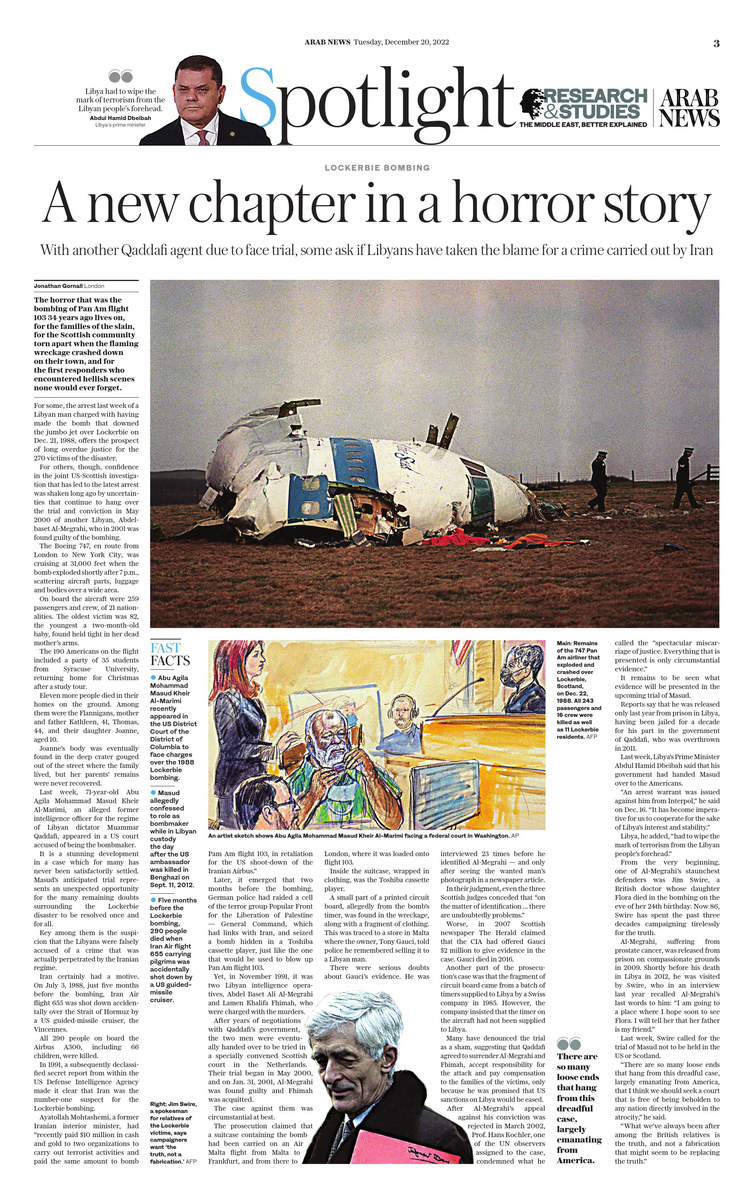LONDON: It happened more than three decades ago, but the horror that was the bombing of Pan Am flight 103 lives on, for the families of the slain, for the Scottish community torn apart when the flaming wreckage crashed down in pieces on their town and for the first responders who arrived to find hellish scenes none would ever forget.
For some, the arrest last week of a Libyan man charged with having made the bomb that downed the jumbo jet over Lockerbie on Dec. 21, 1988, offers the prospect of long overdue justice for the 270 victims of the disaster and their families.
For others, though, confidence in the judicial system and the joint US-Scottish investigation that has led to the latest arrest was shaken long ago by uncertainties that continue to hang over the trial and conviction in May 2000 of another Libyan, Abdelbaset Al-Megrahi, who in 2001 was found guilty of carrying out the bombing.
The undisputed facts of the case, which will doubtless be rehearsed again during the upcoming trial, are harrowing.
The Boeing 747, en route from London to New York City, was just half an hour into its flight and cruising at 31,000 feet when the bomb exploded shortly after 7 p.m., scattering aircraft parts, luggage and bodies over a wide area. The investigators would be faced with a crime scene of 2,200 square kilometers.
On board the doomed aircraft were 259 passengers and crew of 21 nationalities. The oldest victim was 82, the youngest a two-month-old baby, found held tight in her dead mother’s arms.
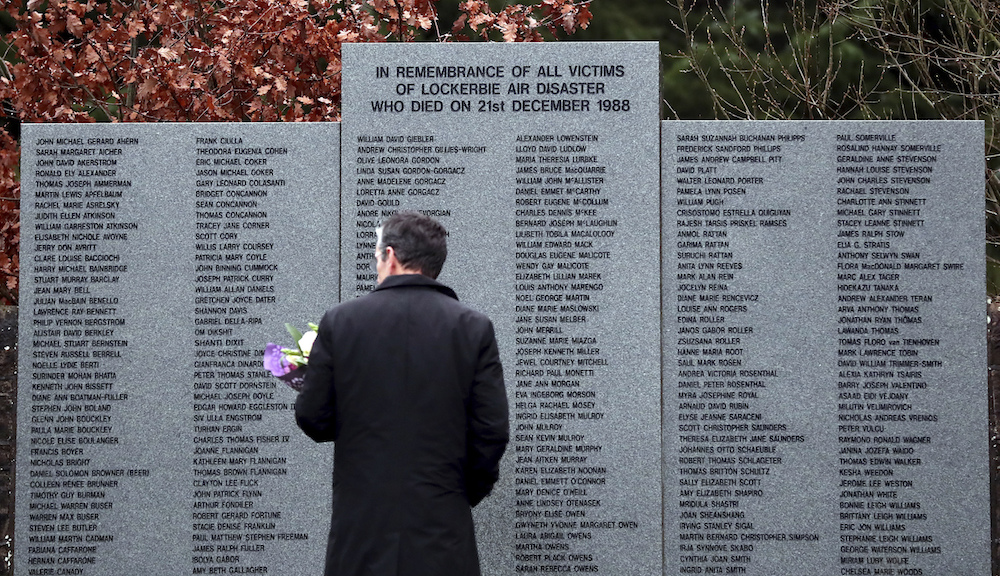
A man looks at the main memorial stone in memory of the victims of the bombing of Pan Am flight 103, in the garden of remembrance near Lockerbie, Scotland Friday Dec. 21, 2018. (AFP)
The 190 Americans on the flight included a party of 35 students from Syracuse University, returning home for Christmas after an overseas study tour.
Eleven more people died in their homes on the ground. Among them were the Flannigans, mother and father Kathleen, 41, Thomas, 44, and their daughter Joanne, aged 10.
Joanne’s body was eventually found in the deep crater gouged out of the street where the family lived, but her parents’ remains were never recovered.
Last week, 71-year-old Abu Agila Mohammad Masud Kheir Al-Marimi, an alleged former intelligence officer for the regime of Libyan dictator Muammar Qaddafi, appeared in a US court accused of being the bombmaker.
It is a stunning development in a case which, for many relatives of the dead, has never been satisfactorily settled. Masud’s anticipated trial represents an unexpected opportunity for the many remaining doubts surrounding the Lockerbie disaster to be resolved once and for all.
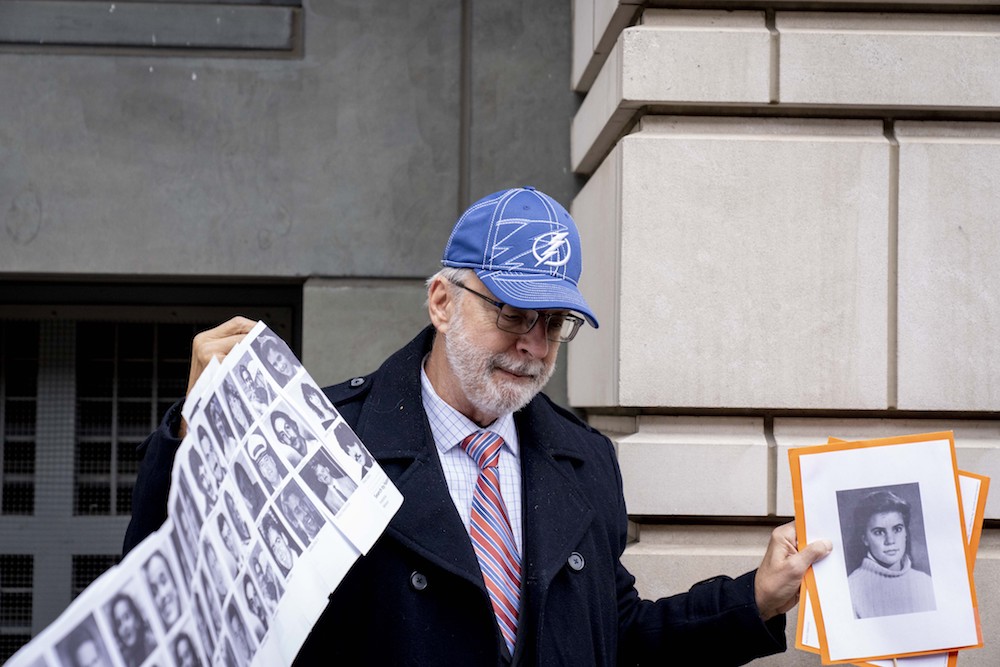
Paul Hudson of Sarasota, Fla., holds up a photo of his daughter Melina who was killed at 16 years old along with the photos of almost a hundred other victims of the bombing of Pan Am Flight 103 over Lockerbie, Scotland, as he speaks to members of the media in front of the federal courthouse in Washington, Monday, Dec. 12, 2022. (AFP)
Key among them is the suspicion, which has persisted for three decades, that the Libyans were falsely accused of a crime that was actually perpetrated by the Iranian regime.
Iran certainly had a motive. On July 3, 1988, five months before the bombing, Iran Air flight 655, an Airbus A300 carrying Iranian pilgrims bound for Makkah, had been shot down accidentally over the Strait of Hormuz by a US guided-missile cruiser, the Vincennes.
All 290 people on board were killed, including 66 children and 16 members of one family, who had been traveling to Dubai for a wedding.
In 1991, a subsequently declassified secret report from within the US Defense Intelligence Agency made it clear that from the outset Iran was the number-one suspect.
Ayatollah Mohtashemi, a former Iranian interior minister, was “closely connected to the Al-Abas and Abu Nidal terrorist groups,” it read.
He had “recently paid $10 million in cash and gold to these two organizations to carry out terrorist activities and ... paid the same amount to bomb Pam Am flight 103, in retaliation for the US shoot-down of the Iranian Airbus.”
The evidence implicating Iran piled up. It emerged that two months before the bombing, German police had raided a cell of the terror group Popular Front for the Liberation of Palestine — General Command and seized a bomb hidden in a Toshiba cassette player, just like the one that would be used to blow up Pan Am flight 103.
Yet in November 1991 it was two Libyan intelligence operatives, Abdel Baset Ali Al-Megrahi and Lamen Khalifa Fhimah, who were charged with the murders. The case against them was circumstantial at best.
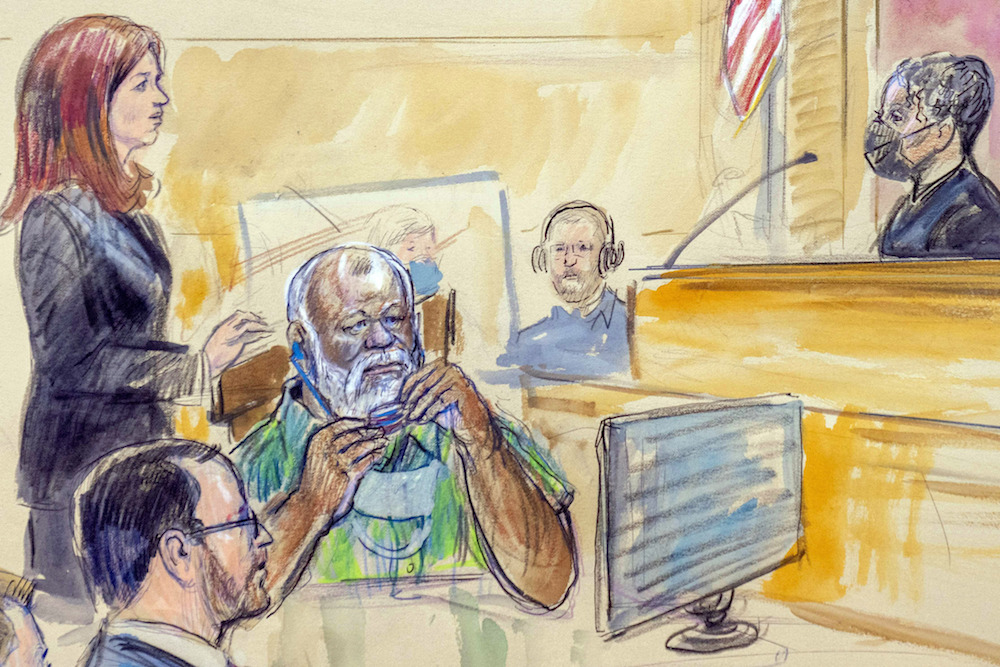
The artist sketch depicts Assistant U.S. Attorney Erik Kenerson, front left, watching as Whitney Minter, a public defender from the eastern division of Virginia, stands to represent Abu Agila Mohammad Mas'ud Kheir Al-Marimi, accused of making the bomb that brought down Pan Am Flight 103 over Lockerbie, Scotland, in 1988. (AFP)
After years of negotiations with Qaddafi’s government, the two men were eventually handed over to be tried in a specially convened Scottish court in the Netherlands. Their trial began in May 2000, and on Jan. 31, 2001, Al-Megrahi was found guilty and Fhimah was acquitted.
The crown’s case was that an unaccompanied suitcase containing the bomb had been carried on an Air Malta flight from Luqa Airport in Malta to Frankfurt. There, it was transferred to a Pan Am aircraft to London, where it was loaded onto flight 103.
Inside the suitcase, wrapped in clothing, was the Toshiba cassette player containing the bomb.
A small part of a printed circuit board, believed to be from the bomb timer, was found in the wreckage, along with a fragment of a piece of clothing. This was traced to a store in Malta where the owner, Tony Gauci, told police he remembered selling it to a Libyan man.
Gauci, who died in 2016, was the prosecution’s main witness, but from the outset there were serious doubts about his evidence. He was interviewed 23 times by Scottish police before he finally identified Al-Megrahi — and only then after seeing the wanted man’s photograph in a newspaper article naming him as a suspect.
In their judgment, even the three Scottish judges conceded that “on the matter of identification of the … accused, there are undoubtedly problems.”
Worse, in 2007 Scottish newspaper The Herald claimed that the CIA had offered Gauci $2 million to give evidence in the case.
FASTFACTS
• Abu Agila Mohammad Masud Kheir Al-Marimi recently appeared in the US District Court of the District of Columbia to face charges over the 1988 Lockerbie bombing.
• Masud allegedly confessed to role as bombmaker while in Libyan custody the day after the US ambassador was killed in Benghazi on Sept. 11, 2012.
• Five months before Lockerbie bombing, 290 people died when Iran Air flight 655 carrying pilgrims was accidentally shot down by US guided-missile cruiser.
Another part of the prosecution’s case was that the fingernail-sized fragment of circuit board found in the wreckage, believed to have been part of the timer that triggered the bomb, matched a batch of timers supplied to Libya by a Swiss company in 1985.
However, the company insisted the timer on the aircraft had not been supplied to Libya, and in 2007 its CEO claimed that he had been offered $4 million by the FBI to say that it had.
Many have denounced the trial as a sham, suggesting that Qaddafi agreed to surrender Al-Megrahi and Fhimah, accept responsibility for the attack and pay compensation to the families of the victims, only because the US promised that the sanctions that had been imposed on Libya would be eased.
After Al-Megrahi’s appeal against his conviction was rejected in March 2002, one of the independent UN observers assigned to the case as a condition of Libya’s cooperation condemned what he called the “spectacular miscarriage of justice.”
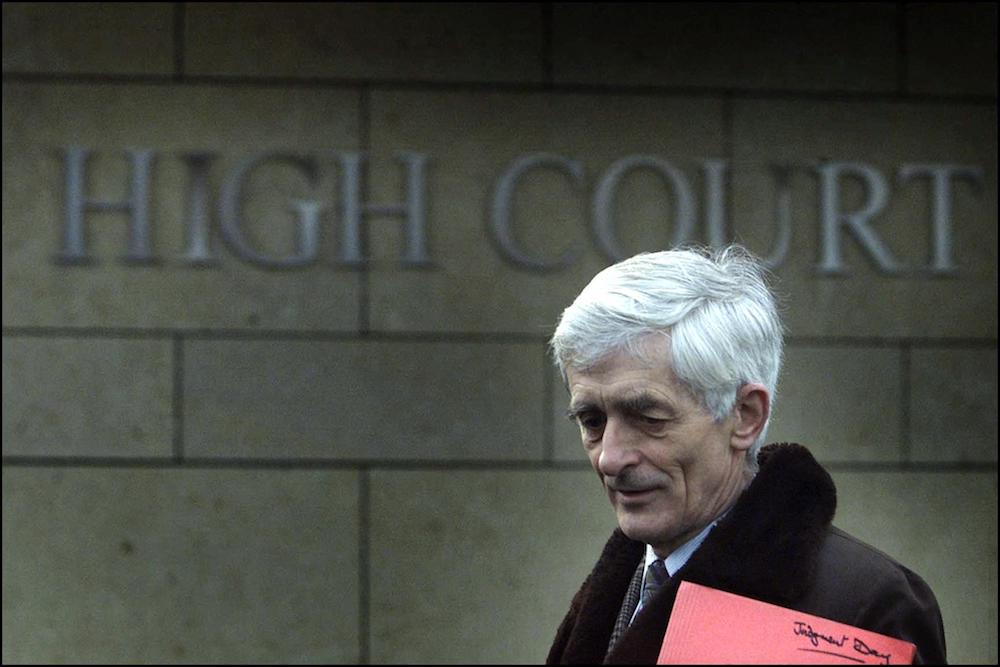
Jim Swire, spokesman for relatives of victims of the Lockerbie plane crash and father of a daughter who died in the terrorist attack, carries a document marked 'Judgement Day' as he arrives at the Scottish court at Camp Zeist 10 January 2001. (AFP)
Professor Hans Kochler said that he was “not convinced at all that the sequence of events that led to this explosion of the plane over Scotland was as described by the court. Everything that is presented is only circumstantial evidence.”
It remains to be seen what evidence will be presented in the upcoming trial of Masud.
Reports say that he was released only last year from prison in Libya, having been jailed for a decade for his part in the government of Qaddafi, who was overthrown in 2011.
Last week, Libya’s Prime Minister Abdul Hamid Dbeibah said that his government had handed Masud over to the Americans.
“An arrest warrant was issued against him from Interpol,” he said on Dec. 16. “It has become imperative for us to cooperate in this file for the sake of Libya’s interest and stability.”
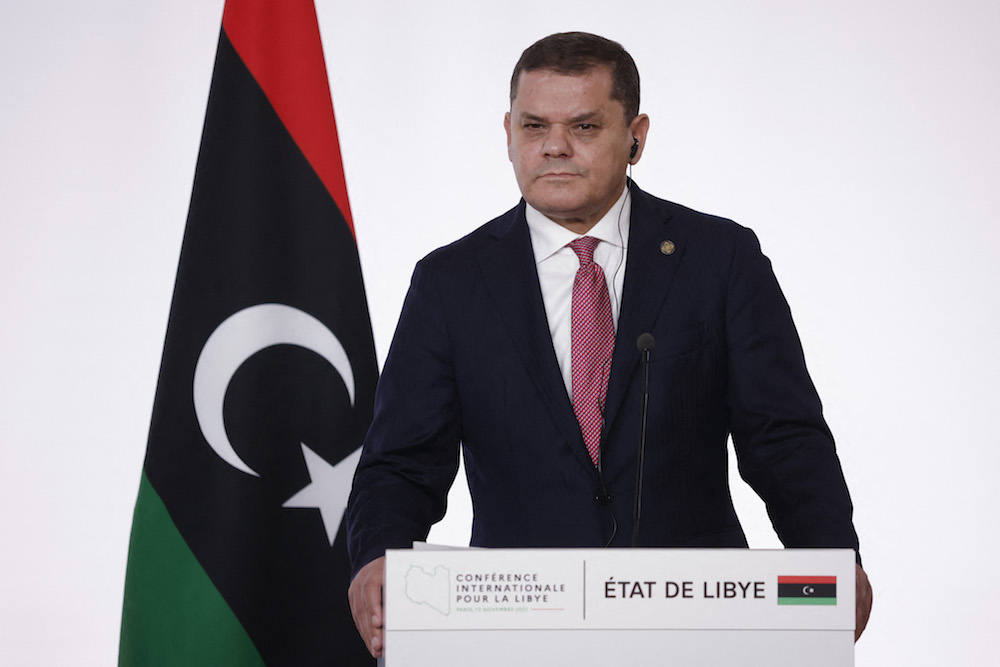
Last week, Libya’s Prime Minister Abdul Hamid Dbeibah said that his government had handed Masud over to the Americans. (AFP)
As Dbeibah put it, Libya “had to wipe the mark of terrorism from the Libyan people’s forehead.”
From the very beginning, one of the strongest advocates for the innocence of Al-Megrahi was Jim Swire, a British doctor whose daughter Flora died in the bombing on the eve of her 24th birthday. Now 86, Swire has spent the past three decades campaigning tirelessly to expose what he believes was a miscarriage of justice.
Al-Megrahi, suffering from prostate cancer, was released from prison on compassionate grounds in 2009. Shortly before his death in Libya in 2012, he was visited in his sick bed by Swire, who in an interview last year recalled Al-Megrahi’s last words to him: “I am going to a place where I hope soon to see Flora. I will tell her that her father is my friend.”
Last week, Swire called for the trial of Masud not to be held in the US or Scotland.
“There are so many loose ends that hang from this dreadful case, largely emanating from America, that I think we should … seek a court that is free of being beholden to any nation directly involved in the atrocity itself,” he said.
“What we’ve always been after amongst the British relatives is the truth, and not a fabrication that might seem to be replacing the truth.”
